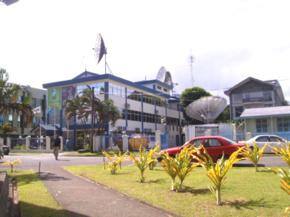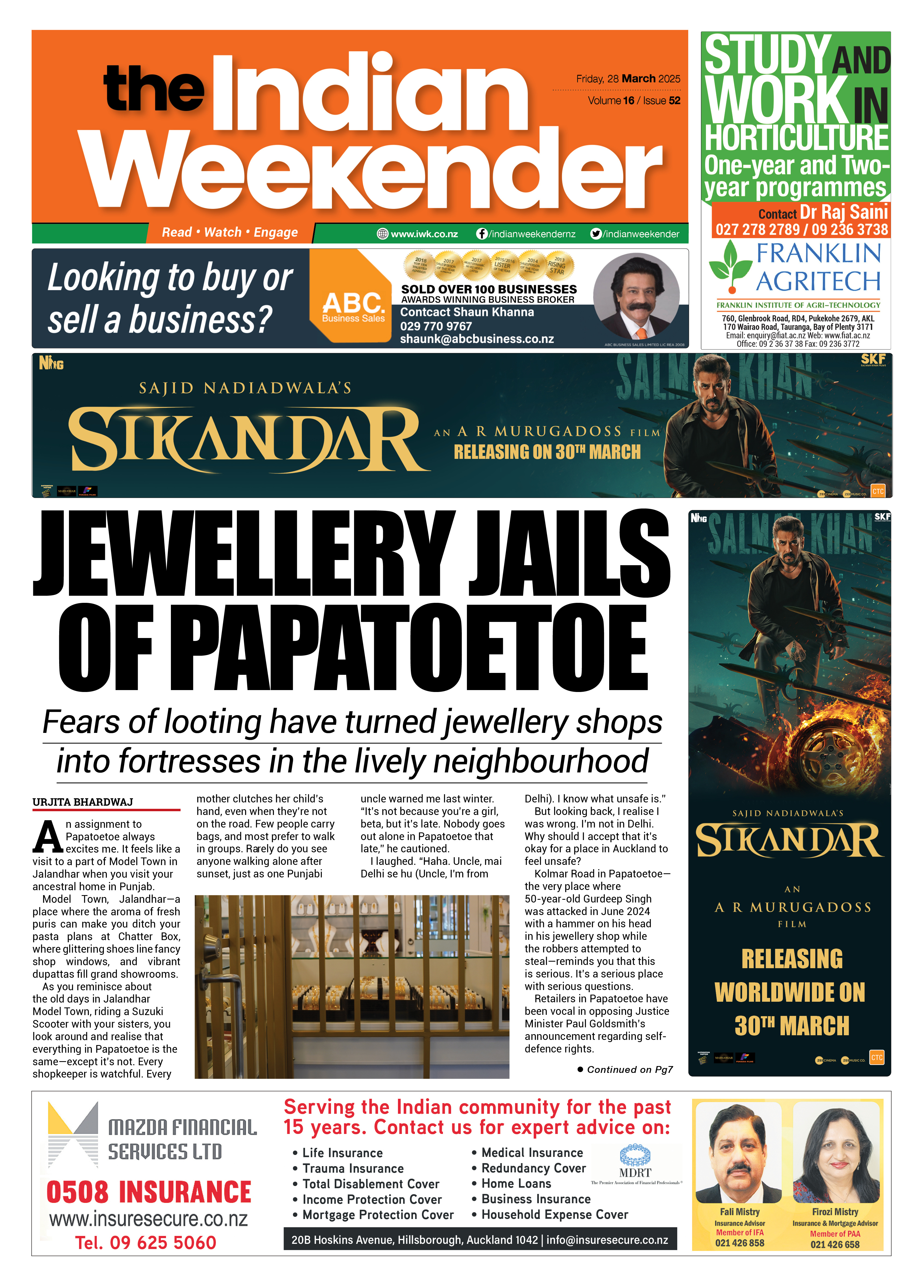Media Reporting on Fiji Needs Balance

September 3 2009
Fiji’s military-propped government has been the focus of much hostility, speculation and demonisation in the Western media. In almost all exposes the presenters have either run afoul of the coup regime or had an acquaintance hard done by the same. Their takes on Fiji therefore, have been tainted. This article analyses blinkered reporting on Fiji in New Zealand, and attempts to place on the public platter a more dispassionate view on the Pacific’s pariah state.
In April, TVNZ ran two short news pieces on Fiji in their 6pm programme. All of their interviewees apart from lawyer Dorsami Naidu were ethnic-Fijians. All of the comparatively prolonged footage on squatter dwellers covered ethnic-Fijians. Two points were being highlighted in particular: one, that the coup has brought about worsening misery; and two, that the people continue to be cowed to keep quiet.
On August 24, Barbara Dreaver (the TVNZ reporter) was interviewed on Maori TV about Fiji’s plight following the “kick” in Cairns, and she highlighted that reporting was not free, that poverty had worsened and that Riyaz Saiyed-Khaiyum’s opinions on Fiji were “understandable” because he was the coup-installed Attorney General Aiyaz Saiyed Khaiyum’s brother.
In the same breath she said that the Fiji Indians “supported” the coup. It is this subtle ethnic slant that creates cause for concern as ironically no misery was graphically shown among Indo-Fijians in her earlier TVNZ skit. And no ordinary Indo-Fijians were interviewed for the footage.
A superficial sidelining has always appeared to be the most politically prudent stance on the Indo-Fijian and the New Zealand media does not help by making subtle insinuations when presenting supposedly knowledgeable coverage of present politics in Fiji. The New Zealand media has failed miserably in this regard and a short reminder is warranted here.
The Indo-Fijian arrived in Fiji in 1879 as indentured labourers saddled with the familiar yoke of making the colony economically viable. Their long struggle for recognition is well documented. Their struggle for acceptance however, continues. This has nothing to do with periodic coups in the country even though the more fanciful and ruthless cannot resist the temptation to rope in the Indian variable whenever they feel short.
All of Fiji’s earlier coups were justified from the perspective of Indian hegemonic designs on Fiji or an inability of the Indian to fit into the Fijian scheme of things. This was the popular line and mediawallahs loved it; so much so that they refuse to entertain any other takes.
A Community TV interview of Dr. Ray Nichol on August 26 was remarkable for the manner in which the interviewer tried to lead and cajole the academic. There were many useful insights that she provided, but selective deafness appeared to prevail.
The 1987 coup was justified as a necessity to save the Fijian race from being overwhelmed by the Indians, and the Indo-Fijian from a violent Fijian backlash. What followed for 10yrs was a fragmented Fijian power-grab that forced an enlightened Rabuka to promulgate a broadly accepted constitution in 1997.
All was well until, against expectations, Chaudhry ascended to power at the 1999 polls. Enter George Speight and his shadowy backers and the hijacking of parliament in 2000. The news media went delirious and the hostages were largely forgotten as the savagery and topsy-turvy world of Fijian politics unravelled.
The period 2000-2006 was again characterised by a scramble to consolidate opportunities among a Fijian elite who were largely dependent on the rural Fijian vote to prolong the pillage within a conveniently-spurious democratic framework. It was within this backdrop that the subtle tug-of-war between Bainimarama and Qarase was played out.
Commodore Bainimarama removed Qarase on December 5, 2006, because it was clear that he could not be toppled through the ballot box. Not only were the constitutional provisions undemocratic, but Qarase and his cohorts had managed to play the rigging game right under the eyes of international “watchers”. How else could the 2006 elections bag some 600,000 valid votes from a population of 800,000?
Bainimarama’s focus now is not only on creating consensus, but to ensure that every vote has the same weight. In this regard, it is not only the Indo-Fijian vote that has always been disadvantaged, but the more significant urban Fijian vote as well. Moreover, elections in Fiji have not been issues-based because of the distorting influence of the race variable. Bainimarama promises to correct this.
He knows that the consensus that he seeks will never materialise. That was probably the most compelling reason for the “Presidential coup” of April 2009 as it cleared the path for easier electoral reforms. No good will come out of isolating the man who holds power in Fiji. That will only aggravate the situation and serve no one’s interest.
Moreover, continued reference to Indians and how they “support” this coup is not only lazy, it is unprofessional. If the Fiji Indian succumbs to the human weakness of feeling perverse pleasure at the forced education of fence-sitters and coup-supporters, should he be blamed for it? I say stop this atrocity; the Fiji Indian was always maligned for the wrong reasons because it served parochial holier-than-thou positions. The media here would do well to rethink the need for balance in reporting.
--
Subhash Appana is an academic and political commentator. The opinions contained in this article are entirely his and not necessarily shared by any organizations he may be associated with both in Fiji and abroad. Email subhasha@ais.ac.nz
In April, TVNZ ran two short news pieces on Fiji in their 6pm programme. All of their interviewees apart from lawyer Dorsami Naidu were ethnic-Fijians. All of the comparatively prolonged footage on squatter dwellers covered ethnic-Fijians. Two points were being highlighted in particular: one, that the coup has brought about worsening misery; and two, that the people continue to be cowed to keep quiet.
On August 24, Barbara Dreaver (the TVNZ reporter) was interviewed on Maori TV about Fiji’s plight following the “kick” in Cairns, and she highlighted that reporting was not free, that poverty had worsened and that Riyaz Saiyed-Khaiyum’s opinions on Fiji were “understandable” because he was the coup-installed Attorney General Aiyaz Saiyed Khaiyum’s brother.
In the same breath she said that the Fiji Indians “supported” the coup. It is this subtle ethnic slant that creates cause for concern as ironically no misery was graphically shown among Indo-Fijians in her earlier TVNZ skit. And no ordinary Indo-Fijians were interviewed for the footage.
A superficial sidelining has always appeared to be the most politically prudent stance on the Indo-Fijian and the New Zealand media does not help by making subtle insinuations when presenting supposedly knowledgeable coverage of present politics in Fiji. The New Zealand media has failed miserably in this regard and a short reminder is warranted here.
The Indo-Fijian arrived in Fiji in 1879 as indentured labourers saddled with the familiar yoke of making the colony economically viable. Their long struggle for recognition is well documented. Their struggle for acceptance however, continues. This has nothing to do with periodic coups in the country even though the more fanciful and ruthless cannot resist the temptation to rope in the Indian variable whenever they feel short.
All of Fiji’s earlier coups were justified from the perspective of Indian hegemonic designs on Fiji or an inability of the Indian to fit into the Fijian scheme of things. This was the popular line and mediawallahs loved it; so much so that they refuse to entertain any other takes.
A Community TV interview of Dr. Ray Nichol on August 26 was remarkable for the manner in which the interviewer tried to lead and cajole the academic. There were many useful insights that she provided, but selective deafness appeared to prevail.
The 1987 coup was justified as a necessity to save the Fijian race from being overwhelmed by the Indians, and the Indo-Fijian from a violent Fijian backlash. What followed for 10yrs was a fragmented Fijian power-grab that forced an enlightened Rabuka to promulgate a broadly accepted constitution in 1997.
All was well until, against expectations, Chaudhry ascended to power at the 1999 polls. Enter George Speight and his shadowy backers and the hijacking of parliament in 2000. The news media went delirious and the hostages were largely forgotten as the savagery and topsy-turvy world of Fijian politics unravelled.
The period 2000-2006 was again characterised by a scramble to consolidate opportunities among a Fijian elite who were largely dependent on the rural Fijian vote to prolong the pillage within a conveniently-spurious democratic framework. It was within this backdrop that the subtle tug-of-war between Bainimarama and Qarase was played out.
Commodore Bainimarama removed Qarase on December 5, 2006, because it was clear that he could not be toppled through the ballot box. Not only were the constitutional provisions undemocratic, but Qarase and his cohorts had managed to play the rigging game right under the eyes of international “watchers”. How else could the 2006 elections bag some 600,000 valid votes from a population of 800,000?
Bainimarama’s focus now is not only on creating consensus, but to ensure that every vote has the same weight. In this regard, it is not only the Indo-Fijian vote that has always been disadvantaged, but the more significant urban Fijian vote as well. Moreover, elections in Fiji have not been issues-based because of the distorting influence of the race variable. Bainimarama promises to correct this.
He knows that the consensus that he seeks will never materialise. That was probably the most compelling reason for the “Presidential coup” of April 2009 as it cleared the path for easier electoral reforms. No good will come out of isolating the man who holds power in Fiji. That will only aggravate the situation and serve no one’s interest.
Moreover, continued reference to Indians and how they “support” this coup is not only lazy, it is unprofessional. If the Fiji Indian succumbs to the human weakness of feeling perverse pleasure at the forced education of fence-sitters and coup-supporters, should he be blamed for it? I say stop this atrocity; the Fiji Indian was always maligned for the wrong reasons because it served parochial holier-than-thou positions. The media here would do well to rethink the need for balance in reporting.
--
Subhash Appana is an academic and political commentator. The opinions contained in this article are entirely his and not necessarily shared by any organizations he may be associated with both in Fiji and abroad. Email subhasha@ais.ac.nz




